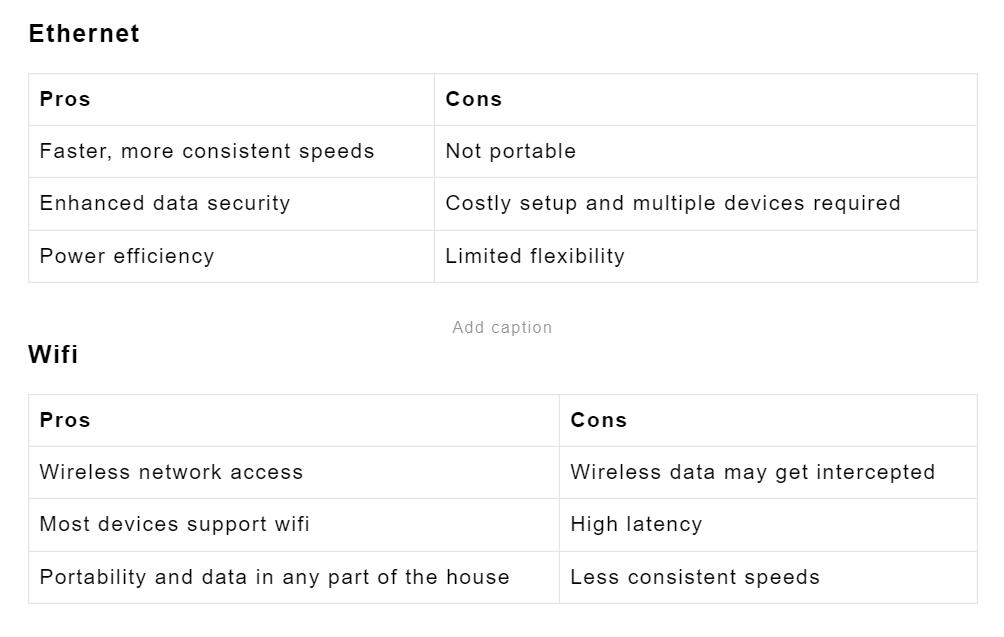When selecting an internet connection, you must first consider your needs. Are you a gamer or vlogger who requires incredible download speeds? Or do you want to work from home and enjoy the occasional movie on a streaming site?
It’s a question of convenience, latency, consistency, and service delivery. Ethernet and wifi are two of the most commonly compared and contrasted internet connection types. However, each has its specific uses, advantages, and disadvantages.
This article will explore these factors, helping you decide what kind of connection best suits your needs.
Table of Contents
- Wifi vs. Ethernet
- Wifi vs. ethernet: Pros and Cons
- Best Reasons to Use an Ethernet Connection
- Best Reasons to Use a wifi Connection
- FAQs
- Conclusion
Wifi vs. Ethernet
Speed
Generally, ethernet cables provide faster and more consistent speeds than wifi. However, the speed difference is growing smaller thanks to constant technological advances.
Cost
WiFi is cheaper than ethernet, which requires multiple devices and an expensive setup. Wifi isn’t much more expensive than wired access as their services are similar. Moreover, users only have to pay for a wireless router.

3D person browsing
Latency
When it comes to internet latency, ethernet is king. Wifi has high latency, which can create communication bottlenecks and network outages.
Stability
Because ethernet data gets transmitted through electronic cables, it’s less likely to get lost or degraded along the way. Besides, with wifi, the signal gets transmitted wirelessly, making it susceptible to interference by other physical objects or electronic devices blocking the signal.
Security
A common security concern with wifi is the risk of a hacker intercepting personal information like bank account details and emails. Ethernet has none of these problems, thanks to its direct connection to the network through physical cables.

Hacker using laptop
Reliability
Ethernet speed is more reliable than wifi. The method of data transmission is direct and physical and makes it difficult to compromise externally. On the other hand, a wifi network relies on area coverage.
Gaming
Gamers swear by ethernet. Besides, the quick download speeds and low latency make it superior to wifi.
Streaming
Ethernet is better for streaming as well. Additionally, the super-fast speeds will improve the quality of service too.
Wifi vs. ethernet: Pros and Cons

Best Reasons to Use an Ethernet Connection
For PCs
It makes more sense to run cables to stationary devices like a PC workspace. They’re not moved around much like laptops or mobile devices, which are better suited for wireless connections.
For Gamers
In gaming, it’s all about ping. Those milliseconds between you inputting a command and the game responding. It’s a crucial factor, and ethernet’s low latency makes it perfect for gamers.
For Sharing Large Files
When you frequently share large files, you need a fast, reliable connection. Ethernet minimizes buffering thanks to its consistent and speedy download speeds.
For Multiple Devices With Shared Backup
Internet users with multiple devices backed up to shared hard drives, or backup servers would prefer an ethernet connection. Therefore, with ethernet, data travel faster between the shared networks.
For Streaming
Ethernet connections offer a significant boost in streaming quality. Thus consistency and range won’t get affected by fluctuations like wifi.

Optic fiber connection
Best Reasons to Use a wifi Connection
WiFi vs. Ethernet: For Wireless Devices
Wifi is the better option if your home is mostly filled with wireless devices. You can connect as many devices as you want. It also eliminates the clutter that comes with ethernet cables running all around the house.
WiFi vs. Ethernet: For Convenience
Nothing beats the portability of wifi. You can get a network anywhere in your house, and guests can easily connect to your network.

Internet connection
For IoT Devices
Smart devices like TVs, watches and home security systems need Wi-Fi. Also, you can’t cast from your phone to your TV with ethernet cables.
For Restricted Areas
Some places won’t allow you to run cables; sometimes, connecting all your devices with ethernet cables is a huge logistical task. A wireless network is perfect for such scenarios.
FAQs
Is Ethernet Faster Than WI-FI?
Yes. Ethernet download speeds of 60 Mbps and upload speeds of 30mbps beat average wifi speeds of 20mbps and upload speeds of 15mbps.

Loading transfer download animation
Is Ethernet Better Than WI-FI?
It depends on your needs. Ethernet is better for internet users who want reliable speeds and secure connections, while wifi is more suitable for users who prioritize freedom and convenience.
Conclusion
Ethernet and wifi offer different qualities for internet users. What’s best for you is whatever fits your routine. Gamers and streamers with static setups for their activities are much better off with ethernet connections’ high speeds and low latency.
If you don’t want a house cluttered with cables, and have multiple devices to connect, then wifi is your best bet. Both are excellent choices for their specific purposes. Simply figure out your needs, and select the option that fits the criteria.
